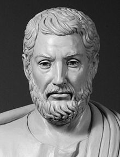Cleisthenes: Democratic Reformer of Ancient Athens
One of the most famous statesmen in Ancient Greece was Cleisthenes, whom many historians say was the true founder of Athenian democracy. He lived in the 6th Century B.C., after the influential lawgiver but before the powerful Pericles. 
Cleisthenes was born about 570 B.C., into a cursed family. His great-grandfather, Megacles, had tried to stop another nobleman, Cylon, from declaring himself tyrant 60 years before. The subsequent tumult had resulted in the deaths of people who had been promised that their lives would be spared; and Megacles, as the leader of the anti-Cylon forces, had gotten the blame and been forced to leave the city. Megacles' family was the Alcmaeonids, who were influential supporters of Solon. This got them on the wrong side of another conflict, this one with the strong soldier Peisistratos, and the Alcmaeonids were again forced into exile. The year was 546 B.C.; Cleisthenes was 25. Peisistratus died in 527 B.C. and was succeeded by his son Hippias. Megacles also died soon after. In the political ebb and flow that followed, Cleisthenes had a brief stint as chief archon, in 525 B.C.; his prominence was short-lived, however, and he was on the outside again. More than a decade later, Cleisthenes and the rest of the Alcmaeonids defeated the faction led by self-appointed tyrant Isagoras and returned to Athens in triumph, thanks to some support from both Delphi and Sparta. In 508, Cleisthenes, as newly installed leader of Athens, introduced his reforms, primary of which was the destruction of hereditary privilege. The public rights and duties of a citizen, Cleisthenes reasoned, should stem from membership in a location, not from possession of a certain bloodline. The reforms replaced the traditional four area tribes with 10 geographically based "tribes." To the Council, newly increased in membership to 500, each of the 10 tribes would send 50 representatives. The guiding principle in these reforms was isonomia, equal rights for all, a concept first championed by Solon. The most glaring example of this idea was the new policy of sortition, the random selection of citizens for government roles. (Up to this point, governmental leaders had handed out political appointments to relatives and friends.) As a result, participation in public life was greater than it ever had been. Cleisthenes is also thought by many historians to have introduced the mechanisms, if not the concept, of ostracism, the practice of exiling someone by voting to expel them from Athens for 10 years.
|
|
Social Studies for Kids
copyright 2002–2026
David White




